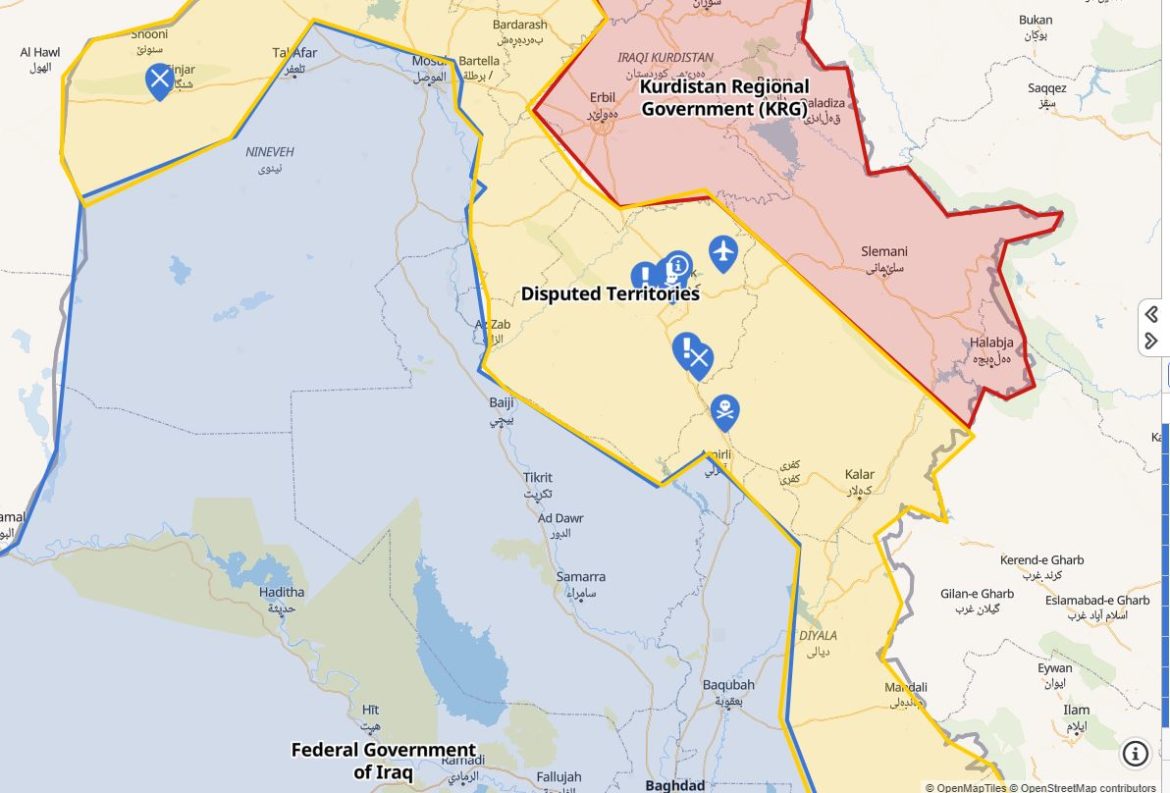1.1K
Kirkuk
- At the request of the Iraqi Ministry of Defense, the Real Estate Directorate and Agriculture Department in Kirkuk have allocated 500 dunams (123 acres) of Kurdish-owned lands in the Kuli Tapa village in the Daquq district to the military. According to the leaked memorandums issued on January 4 and 8 of this year, the Agriculture Department of Daquq approved the transfer for the construction of a new Iraqi military base. Kurdish residents of the village protested and attempted to prevent the construction of the barracks because the allocated land on which it is set to be built is Kurdish property.
- On Friday night, a suspected Turkish drone bombed Saydan stream between Saydan on the road between Chamchamal and Shwan districts. According to activists, the drone allegedly hit Kurdistan Workers’ Party (PKK) members, killing two and wounding one.
- On March 5, the Iraqi Defense Ministry announced the names of the admitted candidates for the 113th officer college, which includes 950 people, including 168 residents of Kirkuk. According to the list, out of 168 residents of Kirkuk in the officers’ program, 149 are Arabs, 12 are Kurds, and 7 are Turkmen. Broken down further: 89% of the admitted students are from the Arab community, 7% from the Kurdish community, and 4% from the Turkmens. In the latest election, Kurdish parties won 52 percent of the vote, but Baghdad’s policies of discrimination against minorities are ongoing. The Arab community is also dissatisfied since most accepted students are from the Jabouri tribe, which dominates positions in the province, backed by the acting governor Rakan al Jabouri.
- On March 6, Ali Nazim, a Kurdish man of the Kakai’ belief from the Daquq district, was released by Iraqi authorities. Nazim and six other Kurds were charged with “terrorism” in 2017 following attacks by Iranian-backed militias and the federal government on Kirkuk. The Kurds denied involvement and announced they were forced to confess under torture.
- In June last year, the Kirkuk administration announced the opening of a women’s shelter as a refuge for women who are subjected to domestic violence. Six months after the ceremony, the shelter remains empty and has no employees. During a demonstration on March 8 in Kirkuk, women’s organizations criticized the failure to open the shelter, accusing the local authorities of turning a blind eye to issues facing women.
- On March 7, the Iraqi Prime Minister’s press office said that Mohammed Shia Sudani directly supervised the signing of three contracts with the German company Siemens to repair and improve power plants in Kirkuk province and the two power plants in Baghdad. According to the statement, the German government will supervise the projects to ensure their proper implementation. The plants themselves are German-built and the five-year project will generate an additional 1,400 MW of electricity annually.
- On the morning of March 3, a senior Turkish-backed Turkmen Front security official was assassinated by an IED planted in his car. The incident occurred when Ahmad Tahir, the former head of the Turkmen Front guards’ office, started his car in the yard of his home to go to Friday prayers, but minutes later his car exploded and killed him instantly. In response to the incident the Turkmen Front announced, “Ahmad Tahir, a retired officer and former head of the Turkmen Front guards office, was assassinated by a bomb attached to his car.” According to security investigations, Ahmad Tahir was targeted by a 400-gram TNT bomb. His assassination has also sparked controversy among the leaders of the Turkmen Front since the group’s internal politics were contentious, and included a subset of the Turkmen Front specifically backing Ahmad Tahir in leadership elections.
Tuz Khurmatu
- On March 9, Da’esh terrorists released two Kurdish shepherds who had been kidnapped several months earlier. The families of the shepherds paid a $50,000 ransom. For years the terrorist group has been generating income through kidnappings.
Shingal (Sinjar)
- On March 4, the Iraqi government’s National Mass Grave Excavation Team, in coordination with forensic medical experts, began the process of excavating a mass grave of Yazidi victims in the Hamadan area of Shingal. According to the Iraqi Mass Graves Office, more than 30 bodies of Yazidi citizens are expected to be in the grave, all of them from the village of Hamadan. According to official statistics, more than 80 mass graves and dozens of individual graves have been found in Sinjar, which date back to the time of genocide committed by Da’esh terrorists in 2014.

